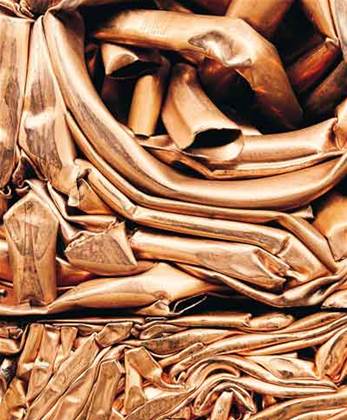The NSW Attorney-General Greg Smith has heeded calls from NSW utilities to impose tougher regulations on the local scrap metal industry in the hope of curbing copper theft from substations and street poles.

Smith's department is mulling legislative amendments that could prohibit cash-only payments to those with hauls of copper deemed suspicious, which would create a paper trail required to trace stolen metals from the likes of utilities, telcos, plumbing supplies and construction sites.
The NSW Attorney-General reassured some of those utilities affected at a meeting of the NSW Utilities Copper Theft Security Committee this week, the first since December.
First established in 2007, the committee includes representatives from NSW Police, the NSW Department of Fair Trading and the Australian Tax Office. Also included are utilities Endeavour Energy, Country Energy and Ausgrid along with Telstra, State Rail and Sydney Water.
A spokesperson for the Attorney-General's department told iTnews that the department's crime prevention division is negotiating with Police along with the finance and fair trading departments as to possible legislation.
Amendments would likely be targeted for the Pawnbroker's and Second Hand Dealers Act 1996.
The Attorney-General did not provide a timeframe as to when this legal advice would be presented, but a further committee meeting scheduled for early August is likely to provide further insight into changes.
The amendments would bring NSW in line with other states, which were deemed to have tougher regulations on second-hand scrap metal dealers.
Copper crime hike
After a relative lull in thefts, NSW Crime Stoppers has witnessed a general increase in copper thefts on the back of local prices reaching more than $10,000 per tonne, according to the Australian Electrical and Electronic Manufacturer's Association.
The high prices and subsequent thefts have led to several local arrests since the beginning of the year, including a Windsor man arrested by police in January after being caught cutting earthed copper straps from a street pole.
In the same month, a 50-year-old Newcastle month pleaded not guilty to eight counts each of larceny and destroy or damage property brought against him by NSW Police. It was alleged he posed as a telephone technician to steal $110,000 worth of Telstra's old and active copper lines in December 2010, causing "major breaks in telecommunications for businesses and private residences" in the Newcastle and Lake Macquarie areas.
Several utilities had taken to protecting cables by installing more fencing, extra signage, electronic security and implementing security patrols at substations in the hope of curbing would-be thieves.
Endeavour Energy security manager and committee chairman Grahame Courtney told iTnews the company had also adopted the Datadot microdotting technology, a glitter-like substance that implanted serial numbers on copper to identify the owner of the cables.
The technology, which had also been deployed by authorities in Tulsa, Oklahoma in the United States earlier this year for a similar purpose, had been sprayed on much of the substation copper equipment as well as some of the street equipment, with a phone number for NSW Crime Stoppers.
The company has not suffered any thefts of the microdotted copper.
Utilities and telcos hoped eliminating cash-only payments for those selling scrap copper and other metals would at least in part help to create a paper trail and prevent continued thefts.
However, Australian Metal Recycling Industry Association national secretary Paul Ryan said NSW's regulations on second-hand dealers fell behind those of other states.
"I think they'll have trouble with [the proposition]," he said. "The problem with NSW is there's no requirement for a trader to have a second-hand dealer's license, which in many other states you do need.
"There are traders who operate off the back of trucks and the perception is those are the people who generally speaking slip through the nets."
The Australian Tax Office, representatives of which attended the meeting on Monday, had previously attempted to pass a similar motion that would require transactions over $300 to be handed over electronically or by cheque. However, claims that small dealers,pensioners or "hunter gatherers" would be greatest affected saw the department freeze the proposal.
The department has imposed a code of compliance on the scrap metal industry that requires an Australian Business Number for metal intakes worth more than $82.50, at the penalty of having 46.5 percent of the total amount withheld from the seller.
Ryan said many recyclers had also taken to demanding photo identification or requiring a signature for small transactions without a business number.
Despite attempts both within the industry and externally, Ryan said the problem would likely remain rampant for some time.
"It's sort of poor man's gold and people will go to extraordinary lengths to get copper from the ground or building sites," he said.
"We have links to the police where, if we're notified that material's been stolen, we put a search out to members. From time to time we're able to catch crooks, but there's a real difficulty with it."
A recent report from the Australian Institute of Criminology [PDF] had proposed cooperation across government agencies and states with wider availability of information, as well as more effective management of metal supplies as means of preventing further copper thefts.
Read on for an analysis of copper theft as a global problem...
International escalation
Recent instances of copper theft in Australia appear to be more opportunistic than those at the height of thefts during 2008, when it was discovered a corrupt CityRail track manager had supervised theft of copper wiring from railways.
Victorian Police had also discovered an organised racket which sought to ship 8.3 tonnes or $1 million worth of stolen copper wiring from Melbourne to black markets overseas.
The spates led Endeavour Energy, then Integral Energy, to invest $11.2 million with NSW Crime Stoppers in order to launch a public education campaign dissuading thefts. Courtney said the ploy worked for a while.
More recently, copper thefts have exploded in Europe with indexed pricing of the metal rising to more than US$10,000 per tonne at the beginning of 2011. BBC reported copper theft from railway and electricity networks contributing to 770 million pounds lost per year in stolen metals.
The damage bill in France rose to 30 million euros in 2011, according to Reuters, causing thousands of hours in train delays across the past year.
The issue has also proved problematic in the United States at a cost of US$1 billion annual and in South Africa with an estimated damage bill of $38 million during 2010.


.png&h=140&w=231&c=1&s=0)


_(20).jpg&h=140&w=231&c=1&s=0)





 Cyber Resilience Summit
Cyber Resilience Summit
 iTnews Executive Retreat - Security Leaders Edition
iTnews Executive Retreat - Security Leaders Edition
 Huntress + Eftsure Virtual Event -Fighting A New Frontier of Cyber-Fraud: How Leaders Can Work Together
Huntress + Eftsure Virtual Event -Fighting A New Frontier of Cyber-Fraud: How Leaders Can Work Together
 iTnews Cloud Covered Breakfast Summit
iTnews Cloud Covered Breakfast Summit
 Melbourne Cloud & Datacenter Convention 2026
Melbourne Cloud & Datacenter Convention 2026












_(1).jpg&h=140&w=231&c=1&s=0)



